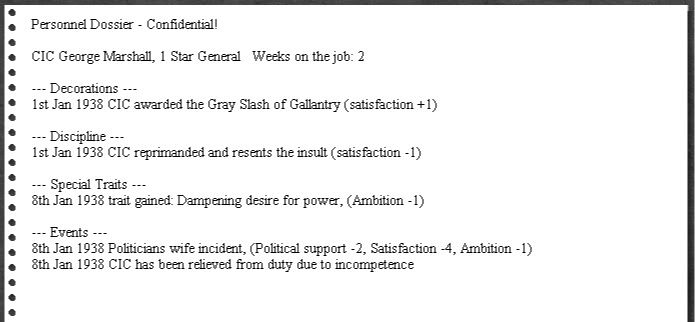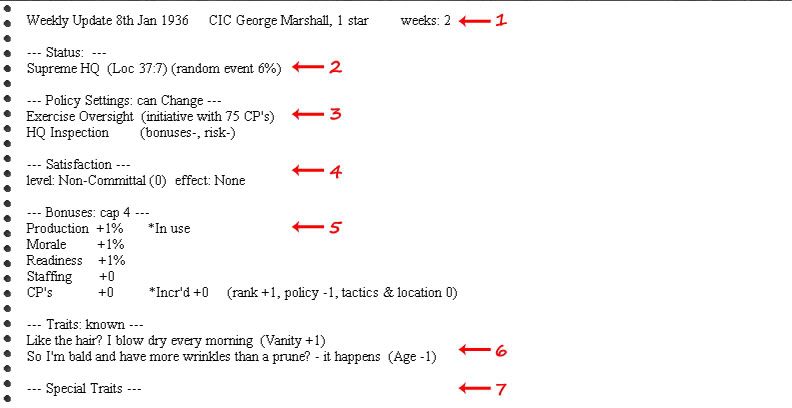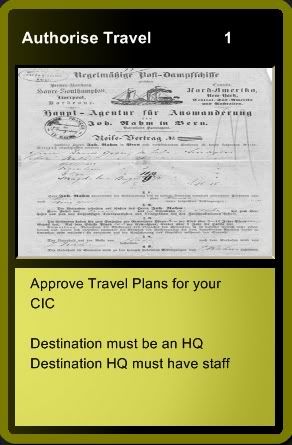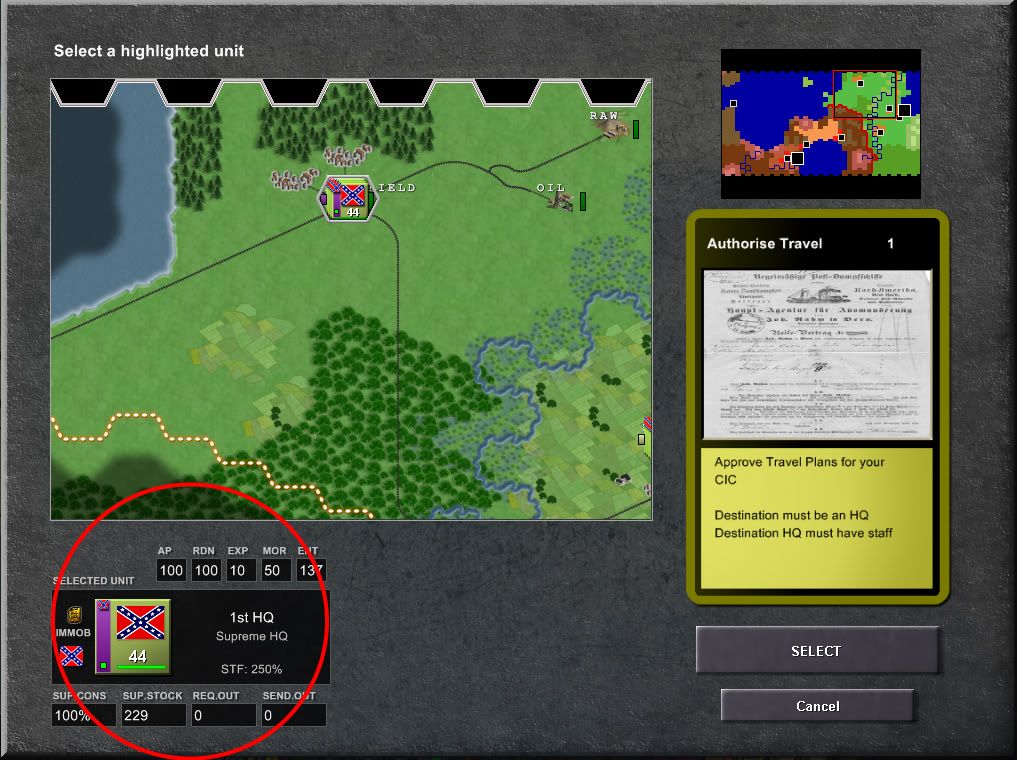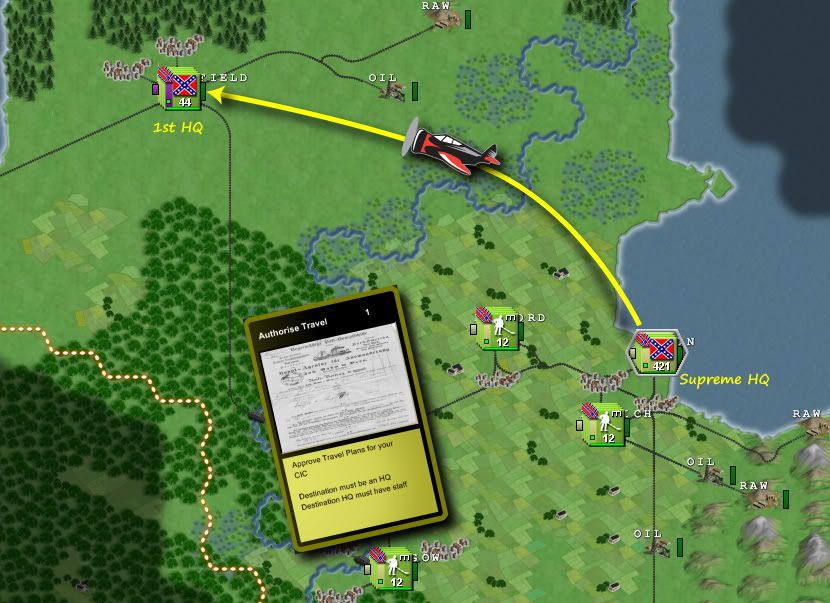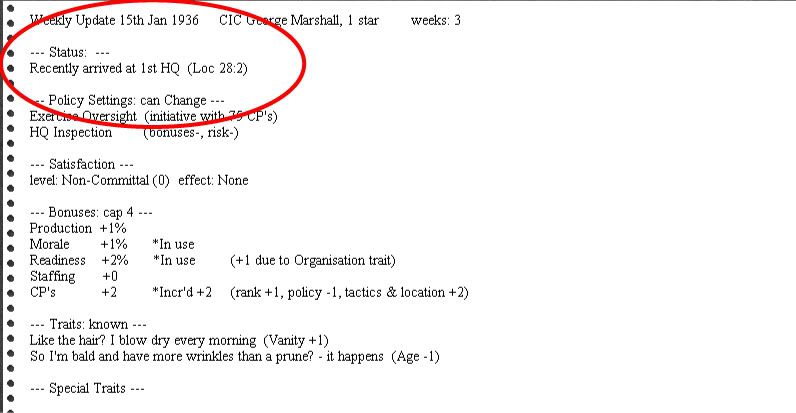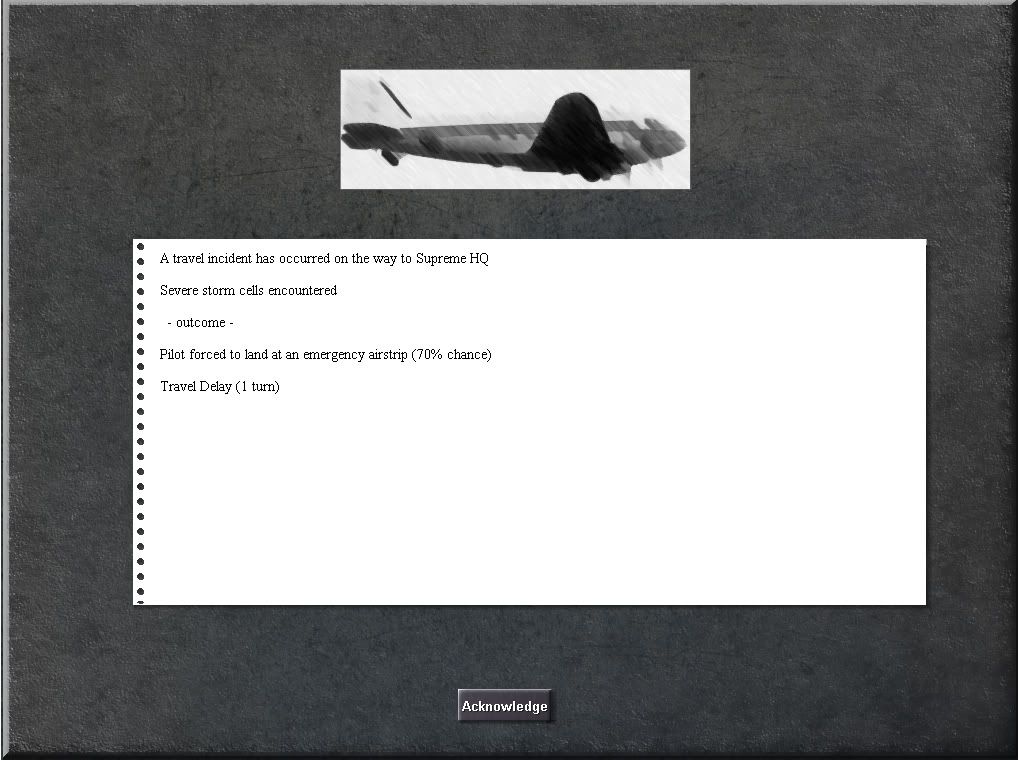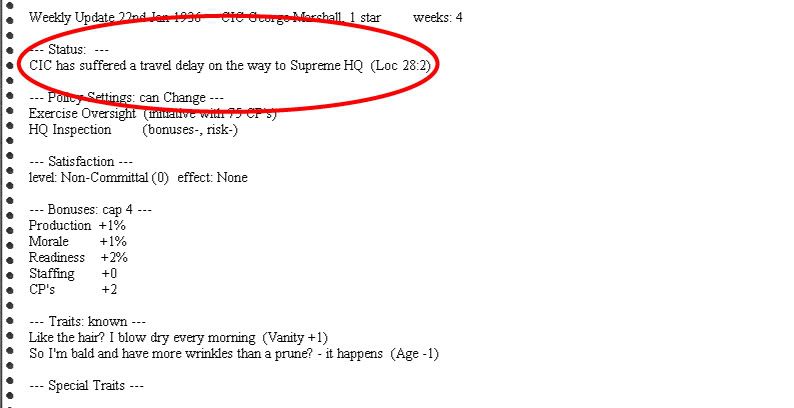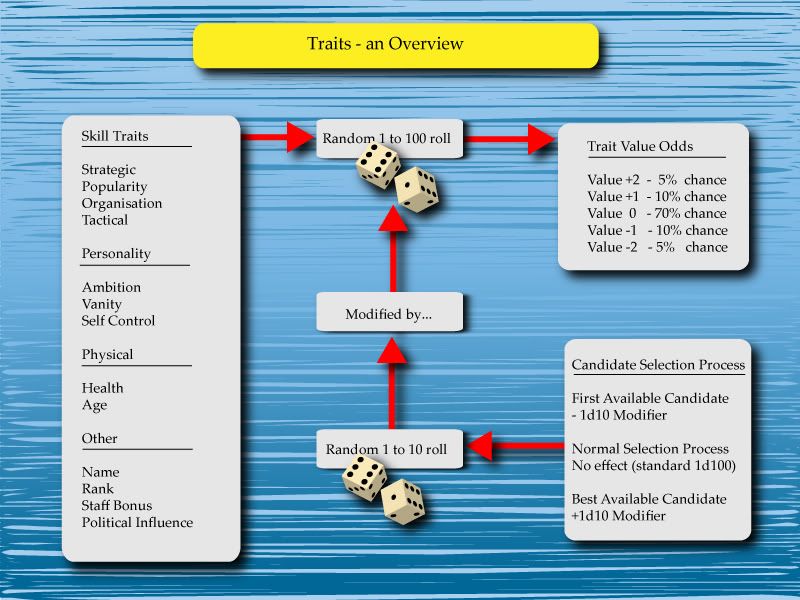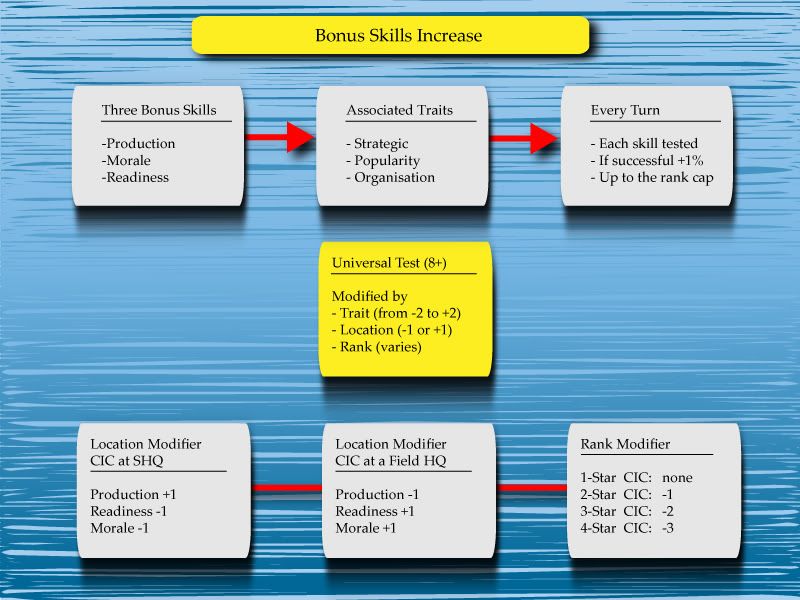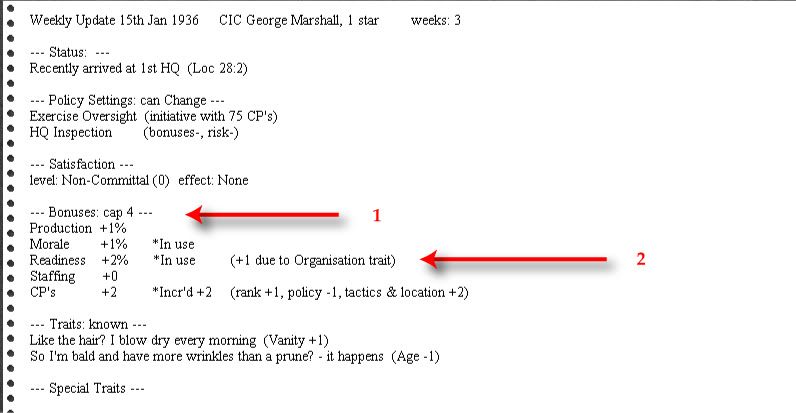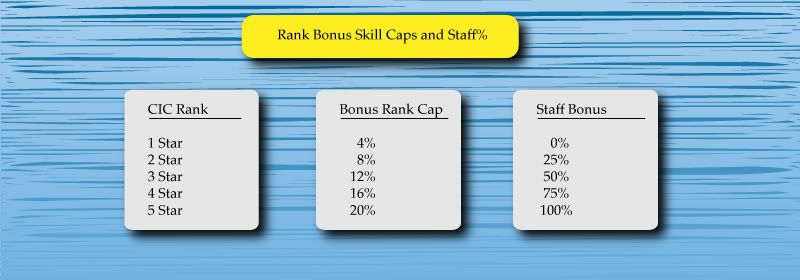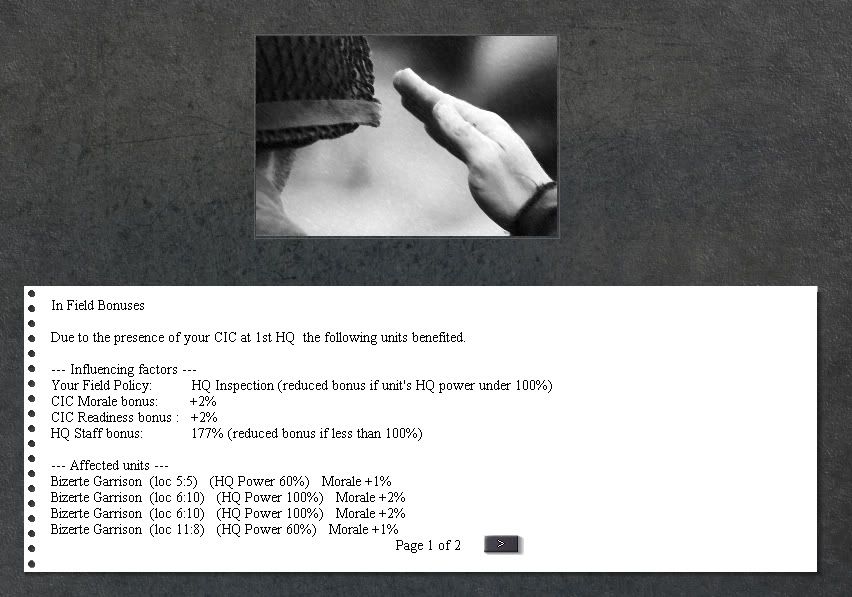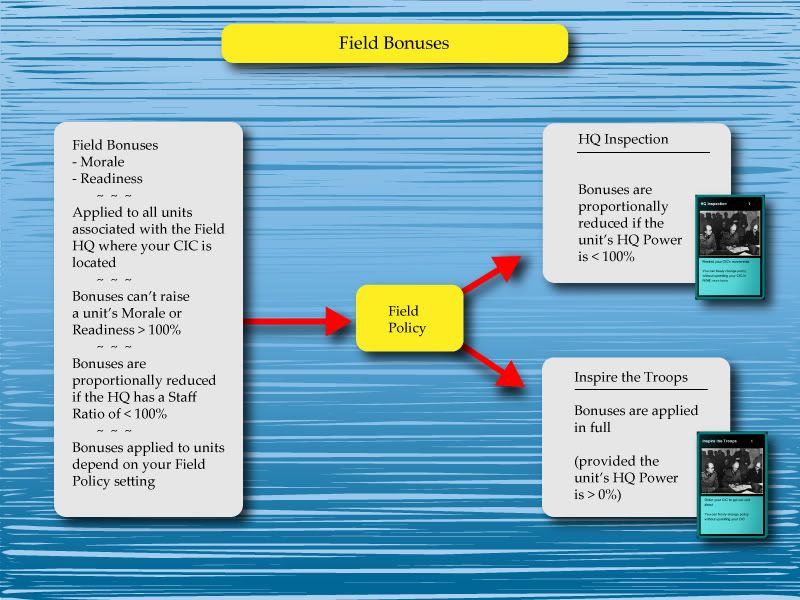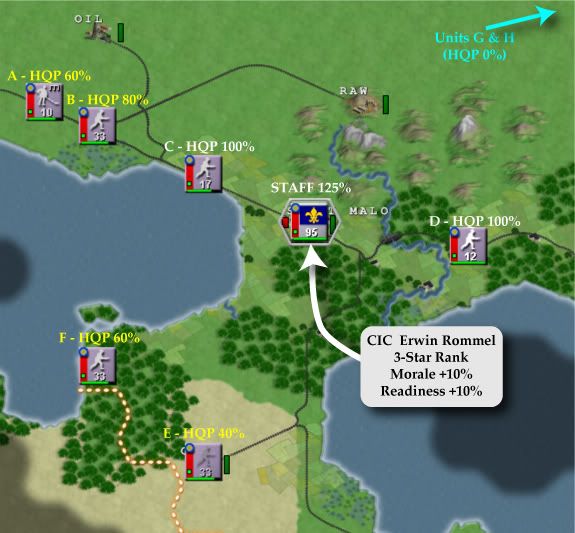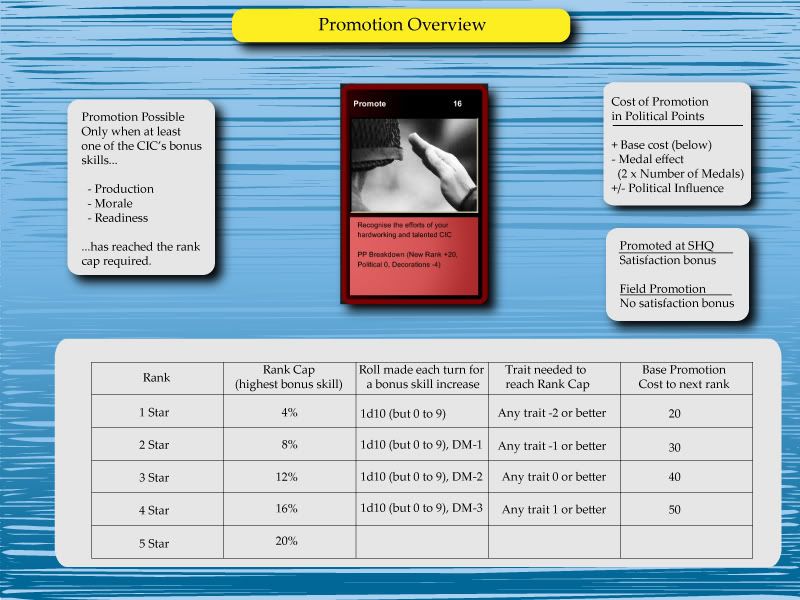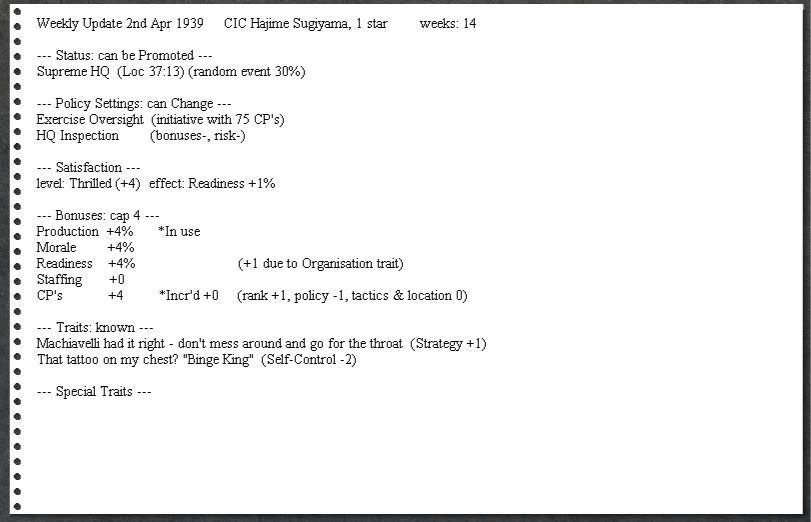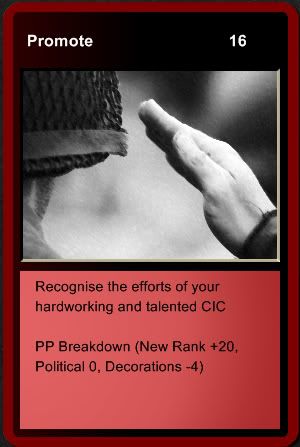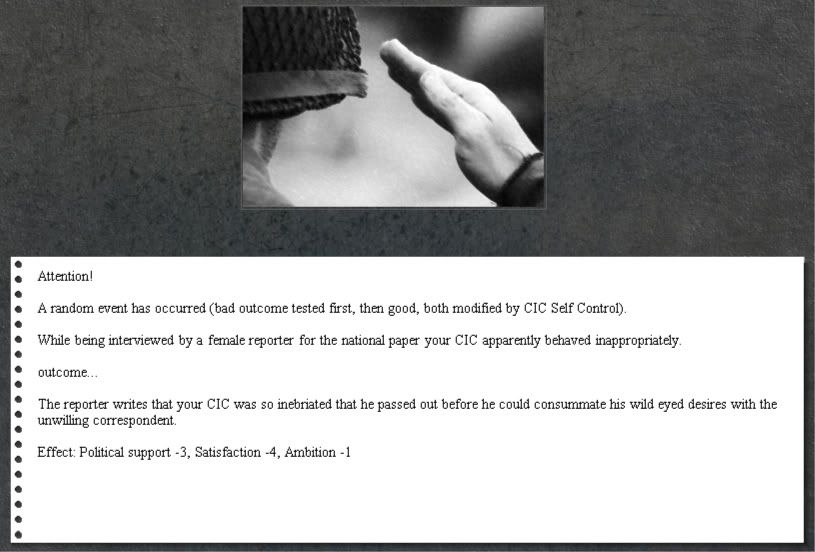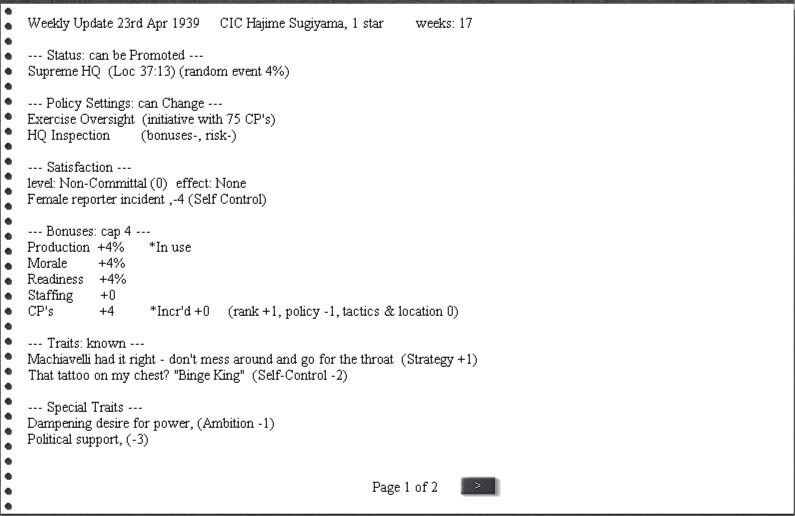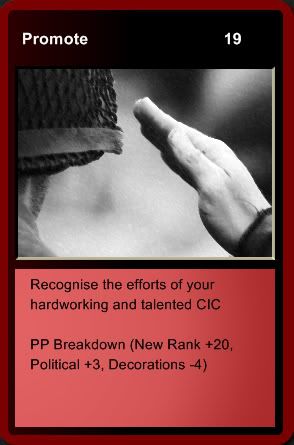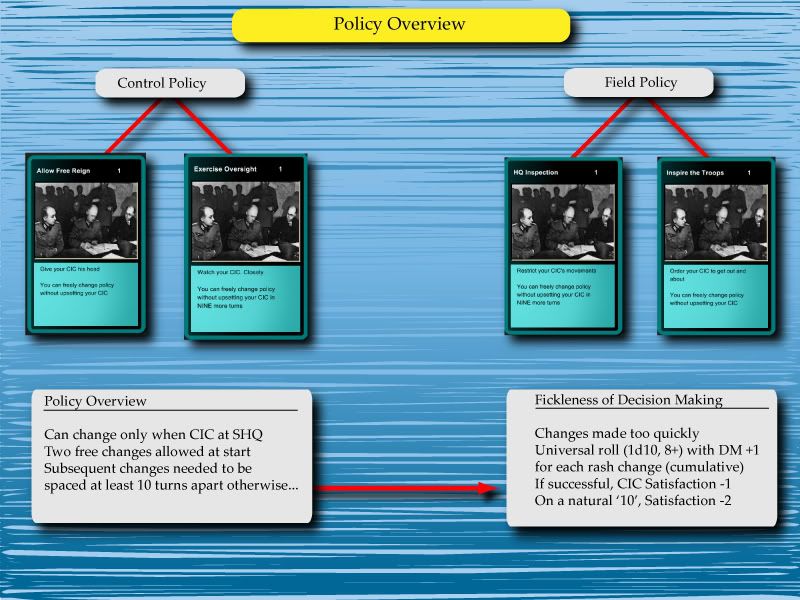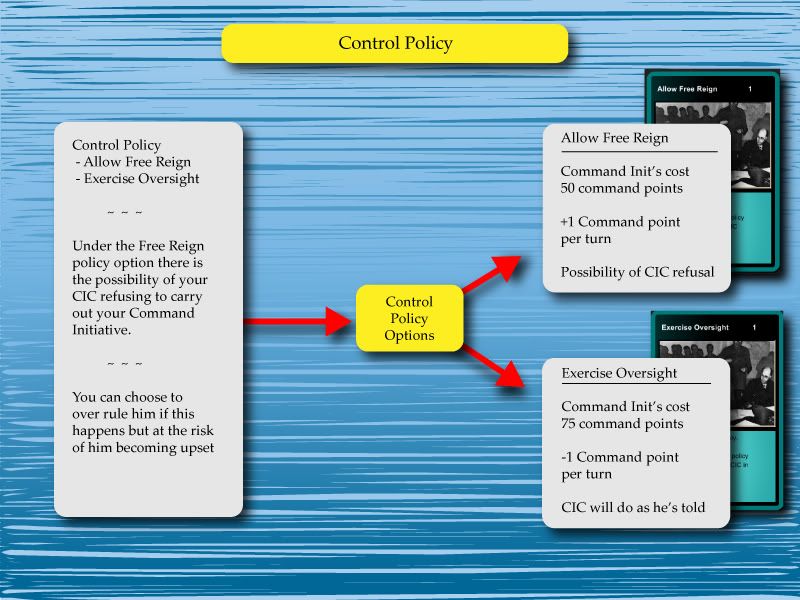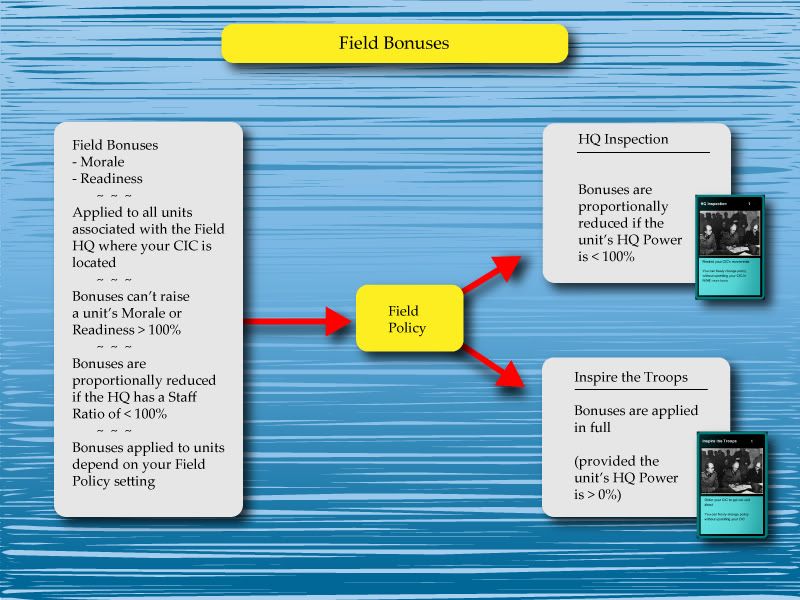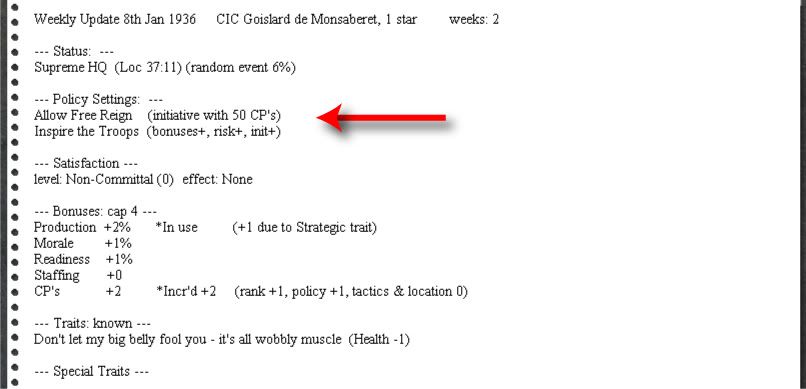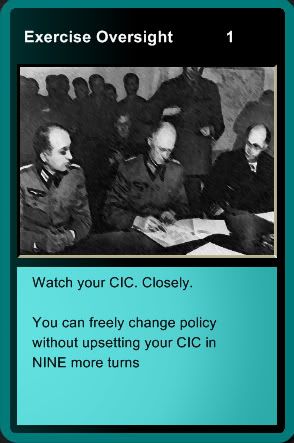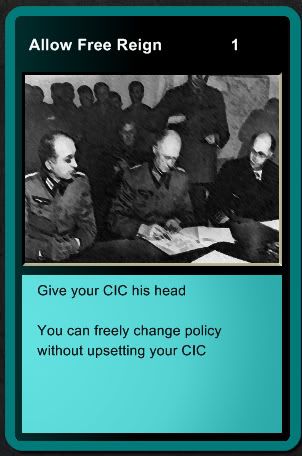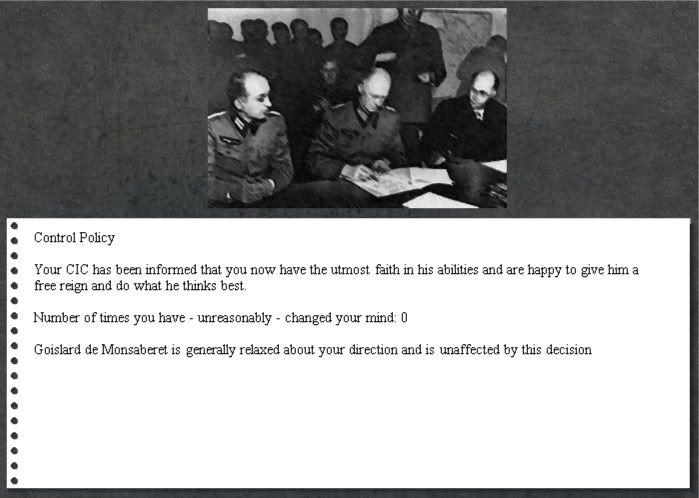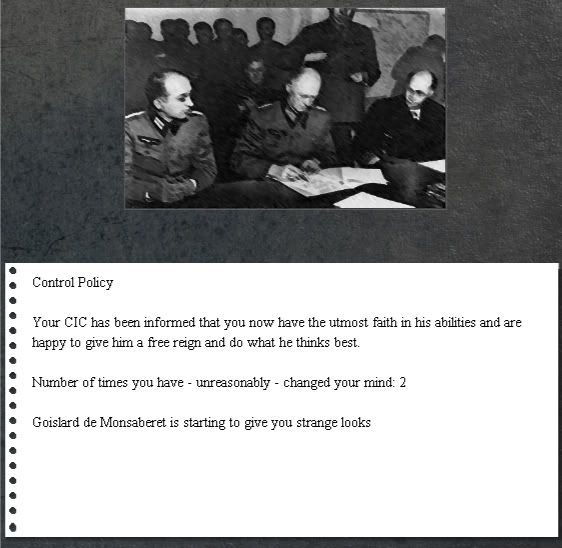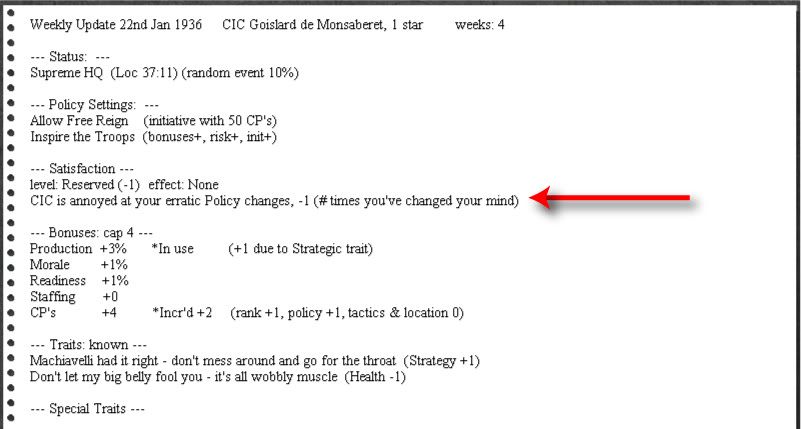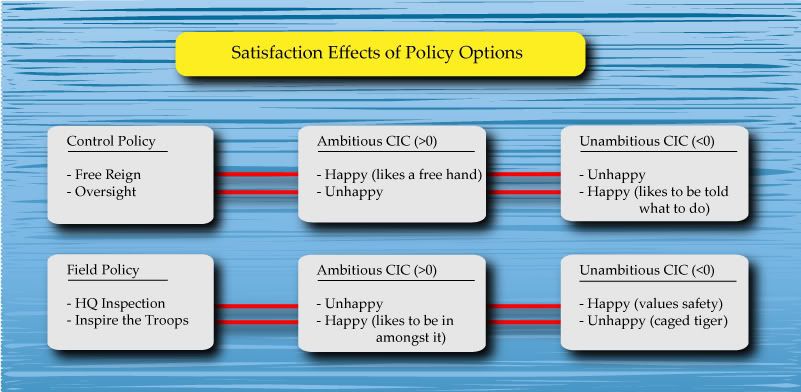Not so brief Overview
The Big Picture
Consider yourself as the head of state. You run the place. In order to facilitate your conquest of the known world you have, as a direct report, a Commander in Chief (CIC).
Note: If you’re an American then the term ‘Commander in Chief’ refers to the President which is a little confusing. However ATG models a range of different countries with widely varied political / military command structures.
Rather than get tangled up with multiple naming conventions I’ve standardised on the term ‘CIC’ as the person who both is in charge of your military operations and who reports to you, the Supreme Political Authority.
Your CIC handles all the daily details of running the war. He has numerous nameless minions underneath him whom he prods and pokes to get the appropriate wheels turning. Your job is to manage your CIC for the best outcome.
Now the picture I’ve painted isn’t an accurate one. In reality you still move all the pieces around the board and make all the decisions. Wouldn’t be much point playing ATG otherwise. But if you imagine yourself as the Head of State with a subordinate CIC then you are on the right track.
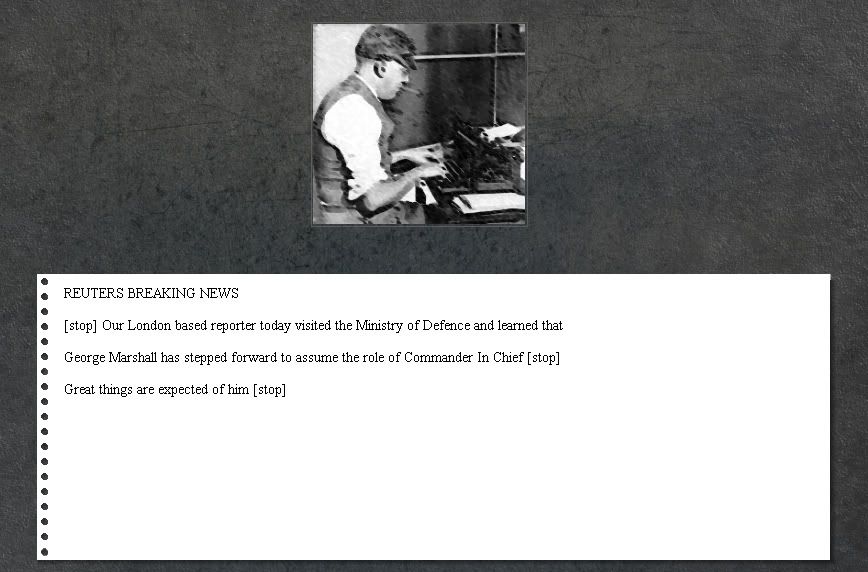
Your CIC, is in effect, another piece on the board. A super piece. But unlike all the other pieces he has a personality.
He has an opinion of his boss, you. He performs better or worse depending on your relationship with him. At times he may disagree with you and interfere with your decisions. If your relationship breaks down he may resign.
He is also vulnerable to all the things that you can imagine somebody might be exposed to in a war zone – disease, injury, accidents, death.
You are provided with a range of tools to enable you to manage your CIC. There is no set path to success here. Each CIC is unique.
Summary
• You are the Head of State residing in the Capital
• Your CIC reports to you
Getting to Know your CIC
A CIC consist of a range of traits as shown below on the left hand side. These traits impact various mod mechanics as shown on diagram, below right.
Without getting bogged down in details the main points are that your CIC has Skill traits which determine what bonuses he provides to your war effort in various situations. He also has a number of personality traits that wend and weave their way through a wide range of underlying processes and provide the basis from which the ‘character’ of your CIC is derived.
Finally there are some physical traits that are fairly self explanatory. Your CIC may be a fighting fit young buck, a frail old man clinging grimly to his walking stick or anything in between.
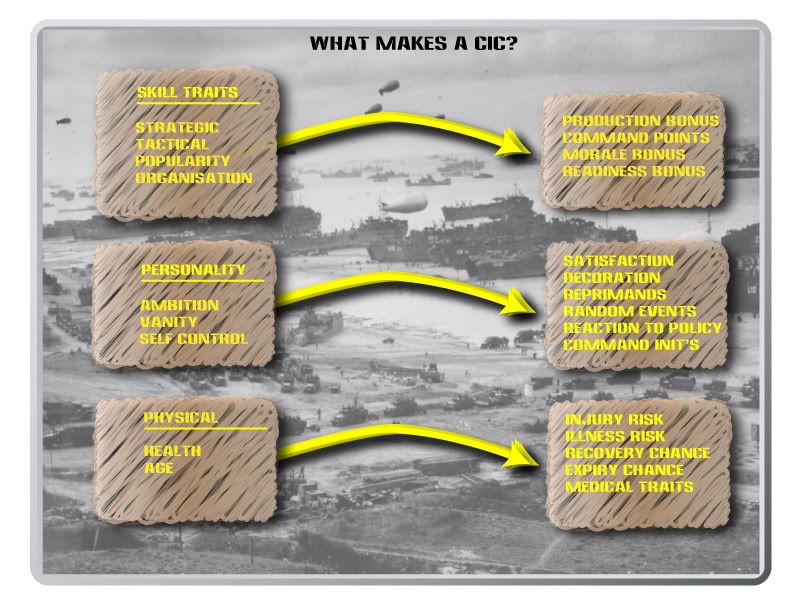
Traits are important and no two CIC’s will be alike. There’s lots of interaction between the various traits that ensures that each CIC will be a swirling mix of competing and contradictory impulses. A bit like real people.
Whenever a new CIC is derived their traits are randomly generated. The algorithms can be weighted one way or another depending on the situation.
To prevent ‘churning’, eg. keep firing your CIC’s until you roll up a good one, it takes a while to get to know your new CIC. His traits are unlikely to be fully revealed until some time has passed.
Additionally firing one is a decision not to be taken lightly. There are consequences.
Summary
• A CIC consists of a randomly determined set of traits
The Benefits of a CIC
Any CIC, no matter how bad, is better than none. It is a fair bet that any CIC will be a mixture of both positive and negative qualities. It is up to you to manage him for the best outcome.
A CIC starts off at a rank of 1-star. The aim is to invest time and political capital into promoting them up to the dizzy heights of a 5-star commander.
Sadly some CIC’s, despite your urgings, won’t be able to rise beyond a particular rank as the ‘Peter Principle’ is alive and kicking within the mod.
In general, the higher the rank, the more useful your CIC will be.
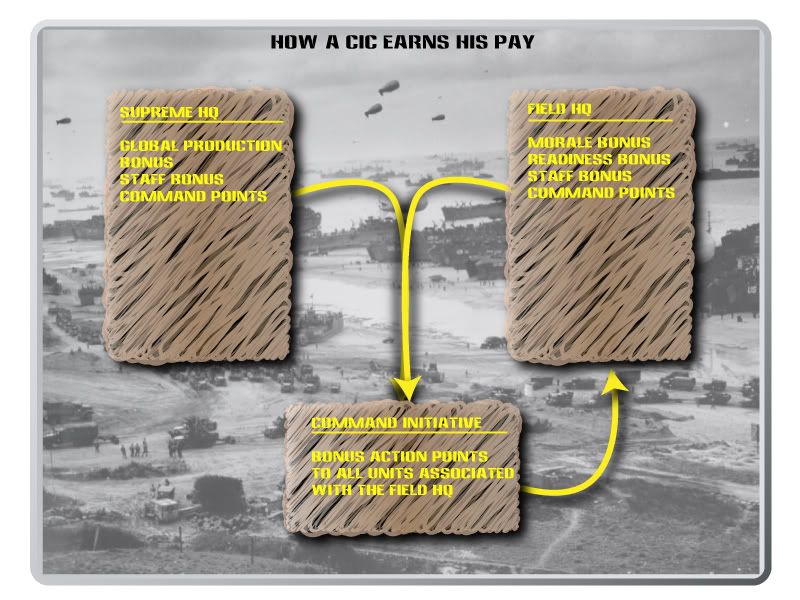
In game terms your CIC is restricted to Headquarter units. The mod delineates these into one of two types – The Supreme HQ and all the other, Field HQ’s.
Supreme HQ is fairly obvious. That’s the one in your capital. There is a reason why the Pentagon is situated in Washington D.C and not at beyond-the-black-stump, South Dakota. The Military and Political command structures of a country need to work together.
Field HQ’s are all the rest. You can move your CIC from HQ to HQ via air travel (the mod takes care of this once you have approved your CIC’s travel plans).
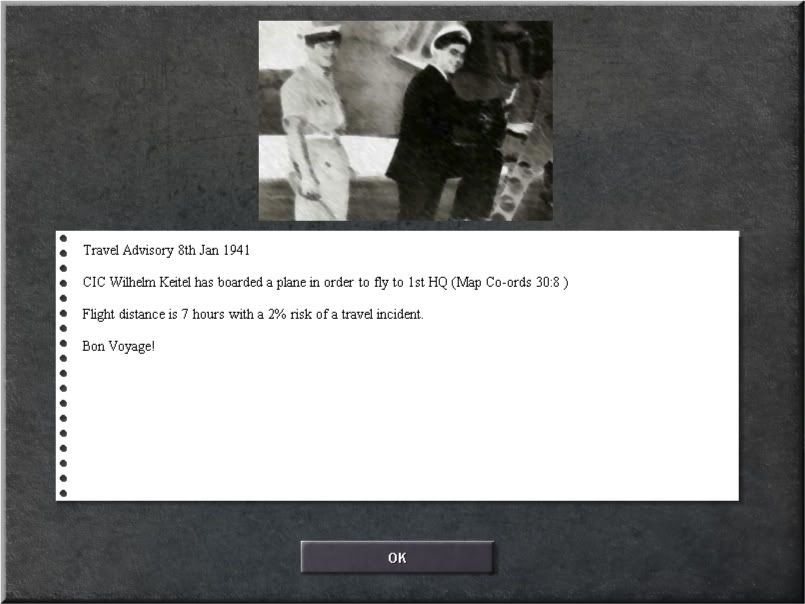
The benefit your CIC provides depends on his location. While he is at your Supreme HQ he provides a global production bonus.
A fully fledged 5-star CIC with maxed out stats would provide a +20% bonus to your entire production per turn. A lowly 1-star can still provide a +4% bonus under ideal conditions.
These are significant game effects. Don’t get too excited, though, as getting to the point where you are benefiting from the 5-star +20% bonus is not easy. It is only at the end of a long, obstacle strewn road.
Now if your CIC is flown out a distant Field HQ then the production bonus ceases. He is no longer there at the centre of it all to kick the inefficient flunkies into action.
Instead he is out ‘In the Field’ where he provides a morale and readiness bonus to all units associated with that particular HQ. In effect he is shoring up a weak area of the front or prepping units for an offensive.
Straight away you have a conflict here. Restrict your CIC to your SHQ (Supreme HQ) and get the benefit of the production bonus or forgo the bonus and send him off to the front to provide an immediate boost to hard pressed troops.
“Big production bonus? ‘course I’m going to keep him at the SHQ!”
Not so fast as your decision isn’t as straightforward as it appears.
Firstly certain CIC’s will, because of their underlying skill traits, be better suited for one location or the other. A ‘hands-on’ CIC, for example, is likely to spend more time out and about which in turn bumps up his field bonuses.
Secondly your CIC, because of his personality, may express his own preferences. Does this matter?
It can. If you and your CIC find yourself pulling in different directions then you are staring down the barrel of a breakdown in relations. Off which I’ll talk about shortly.
There are a range of other factors that can impact on your decision where to position your CIC at any point in time.
A doddery old CIC with failing health isn’t somebody you want to put in the firing line, for example. On the other hand a CIC with poor control over his baser impulses isn’t a good bet sitting around your SHQ when he is exposed to all the temptations that a wartime capital offers.
Command Initiatives are the third benefit that flows from having a CIC. Every turn your CIC accumulates a number of ‘command points’ as a result of diligent staff work and logistical preparations. How many points they gain per turn depends on a range of factors that I won’t discuss here, suffice to say that once they achieve a certain threshold they can launch a Command Initiative.
This involves selected a field HQ and declaring such an initiative. The units attached to that HQ will gain a number of additional, bonus, action points which are very handy when launching an offensive or counter-attack.
Interesting decisions arise from this. The rate at which your CIC accumulates the needed command points and the required threshold for an initiative can be adjusted by policy settings.
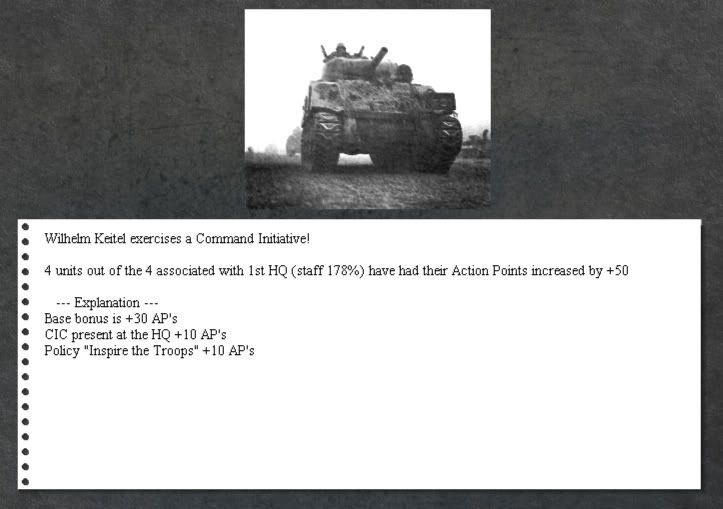
You have the ability to dramatically speed up the process but at the risk of your CIC declaring your initiative invalid and refusing to implement it when required. How big a risk is this? Depends on his personality.
Once an initiative is declared the benefits in extra action points that accrue to the units of the selected field HQ are increased by having your CIC present, on the scene, directing matters personally. If you are willing to put him in harms way – visiting and inspiring the troops in person – then the benefits are even greater.
Your CIC can alternatively do a Colonel Blimp and direct matters from the safety of Supreme HQ, back in your capital, but he will accumulate command points at a much slower rate and any initiatives he launches will have less impact.
Summary
• CIC’s commence at 1-star rank and can be promoted up to 5-star
• Your CIC can only move from one HQ to another
• Your Supreme HQ is at your Capital, all other HQ’s are considered to be Field HQ’s
• Located at your SHQ your CIC provides a global production bonus
• Located at a Field HQ your CIC provides a readiness and morale bonus
• Your CIC can launch ‘Command Initiatives’, these require an accumulation of ‘command points’
• Command Initiatives provide an Action point bonus to units attached to a Field HQ
The Perils of War
Flying your CIC around the map from HQ to HQ is a viable strategy. Put out a bushfire there, give a rousing speech here and be back home in time for dinner.
There are risks. The act of travel itself can involve anything from unavoidable delays to visceral outcomes of a more permanent nature.
Once in the field there is a small but distinct risk of injury from accidents.
Military operation zones aren’t renowned for safe and courteous driving. Add lots of dangerous, loaded weaponry and any visit to a field HQ can be a challenge. Ordering your CIC to get out and about, once he is there, to visit the troops will serve to ratchet up that risk.
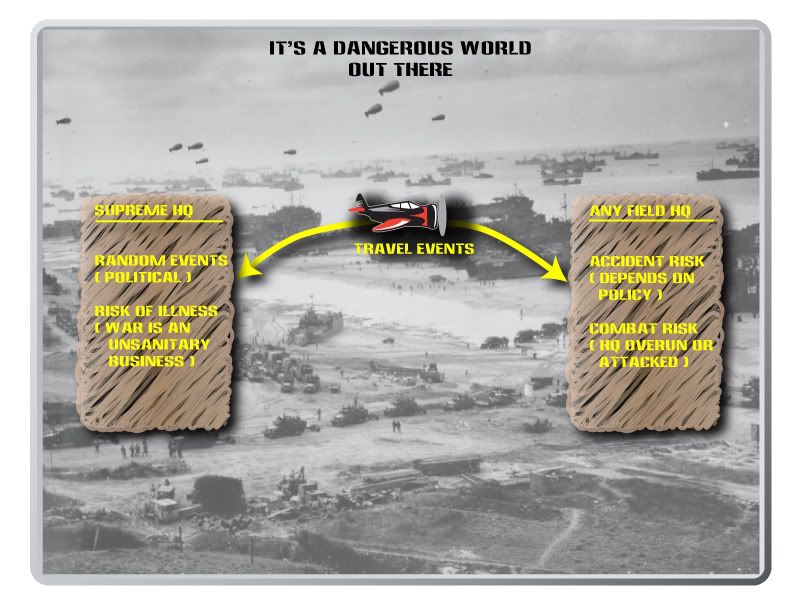
If the field HQ your CIC is visiting is bombed, bombarded or otherwise attacked then state funerals may rear their ugly heads. Like the last chopper out of Saigon, timing the departure of your CIC from a hard pressed HQ, that badly needs his help, is a delicate matter.
In theory the Supreme HQ should be a haven of tranquillity and utmost safety. Maybe. Your CIC could fall ill to any number of ailments that are rampant in times of war and stress. A young, fit CIC has little to fear here.
Sophisticated medical facilities are on hand to deal with any incapacity. As you sweat over your ailing CIC’s recovery you are presented with a range of decisions, none of them easy.
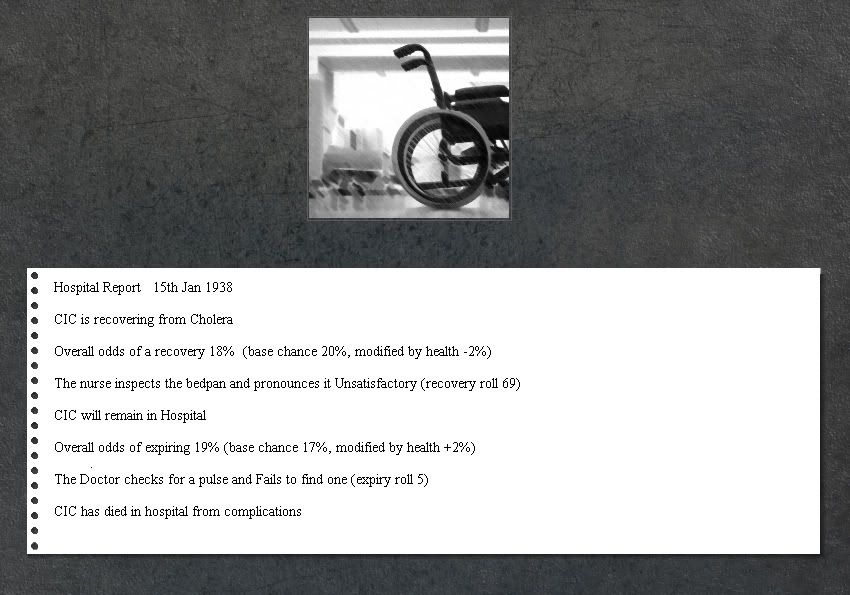
Do I call in favours and access exclusive care facilities in a neutral country? Do I hang in there hoping he will recover on his own accord? Can I afford to be without a CIC for that long? What if he doesn’t make it? Or do I bite the bullet and relieve him from duty as he lies prostrate in his hospital bed, gambling on a better replacement?
Lastly there are the siren calls of various inappropriate attractions and behaviours that tempt your CIC in the midst of a wartime capital. How well your CIC handles these situations depends largely on his level of self-control.
How often your CIC is confronted by the opportunity to sully his own reputation is determined by how long a stint he has spent rattling around your Supreme HQ.
Regular field visits to your various HQ’s can be a breath of fresh air that keeps your CIC on the straight and narrow. Alternatively leaving him to stew in the capital for too long and he is liable to go to seed.
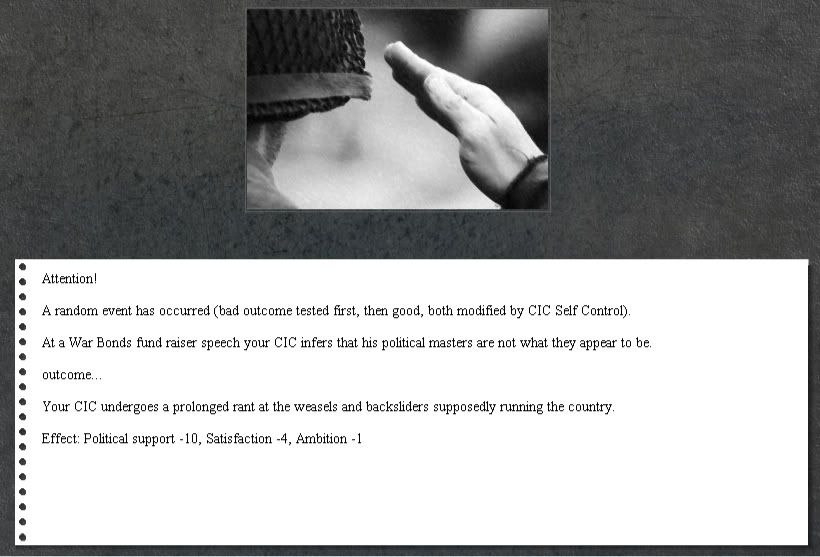 Summary
Summary
• Your CIC lives in a dangerous war zone
• Your CIC’s traits can predispose him to certain risks
• Risks are higher when visiting a Field HQ
You and your CIC
Everybody has a boss. Your CIC’s boss is you.
You have a working relationship with your CIC. This is measured by your CIC’s level of satisfaction. This isn’t how he enjoys his job or how he feels about life in general. No, it is a direct reflection of his opinion of you. Yep, you.
Lots of things can affect it, most of which are shown in the diagram, below right.
Take a moment to read the list. All of the items mentioned are matters that you have control over.
“Well,” I hear you say, “if I control everything then how hard can it be to have anything other than a CIC who hero-worships me?”
At times, quite difficult.
The main obstacle to harmonious relations is that, while you are in charge and can order you CIC to do whatever you want, he also has an opinion. Because you are the person in charge your CIC will do as you ask (implementing contentious Command Initiatives being a possible exception) but if doing so is against his wishes then his level of satisfaction may be affected.
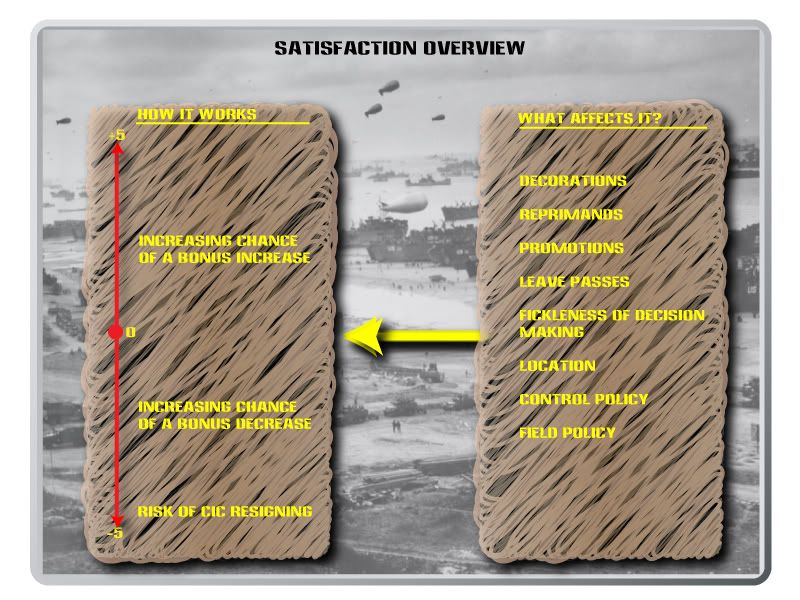
Satisfaction is important because it can directly affect your CIC’s level of bonuses. A happy CIC will thrive in his job and gain higher levels of bonuses.
There is a snowballing effect in action here. The happier he is, the more his bonuses increase which will allow him to be promoted at a faster rate and gain ever higher bonuses.
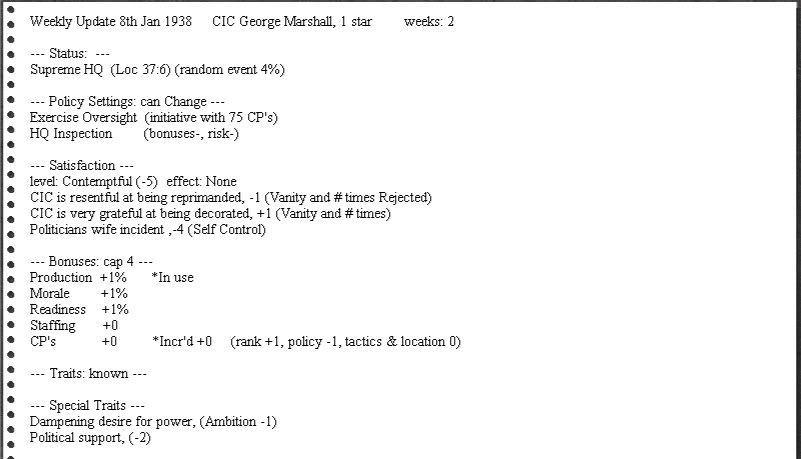
Good oh. But it works both ways. A grumpy CIC leads to a depressed CIC which eventually leads to a CIC who threatens to resign. One who may well do just that.
“Close the door on the way out,” you yell at his back. “There’s no place for dead beats in this man’s army!”
Right about here is where I mention the dark side of having a CIC. Ominous drum roll while I introduce the next topic…
Summary
• Satisfaction reflects your CIC’s opinion of you
• Satisfaction effects result in adjustments to your CIC’s bonuses
• The higher/lower the satisfaction level, the greater the chance of bonus gain or loss
• A sufficiently upset CIC will resign
What happens when I don’t have a CIC?
It would be nice to have a CIC that provides bountiful benefits and who wafts politely away once you wave your magic wand and tire of him. ‘Decent bloke’, you think, ‘but time that he was gone. I’ll run the show from now on.’
Unfortunately it doesn’t work like that. Once you tick the ‘Leader’ option box at the start of the game you are making a commitment to a command structure that has you at the top as the supreme political authority and a Commander in Chief (CIC) directly underneath you who runs the war effort.
All well and good but what happens when you don’t have CIC? Perhaps you fired or replaced him? Maybe he died of as a result of an accident, illness or enemy action? Could be that he resigned.
Either way you don’t now have a CIC. This is bad.
Imagine yourself as President of a large country. You are busy fighting wars on multiple fronts. One day, out of the blue, the Chairman of the Joint Chiefs of Staff doesn’t turn up for the daily briefing due to one of the reasons stated above.
All of a sudden your War Office is a headless chook, running around not quite knowing what to do. Sure, replacements step into the appropriate shoes and the machinery of war keeps grinding on but not very
efficiently.
You do what you can but you are the President, not a military dynamo. Without a CIC in place, your war effort is seriously hampered.
How badly? Well it depends on the level of chaos which results from the departure of your last CIC. The manner of his leaving.
Without going into specific details the absolute worst case scenario is if your CIC unexpectedly dies or resigns. One day there, the next day gone.
You have, commencing immediately, a -30% penalty to all of your production. Minus thirty!
If that was only for one turn then perhaps that’s a steep, but acceptable, price for clearing the dead wood from the office.
Perhaps. What happens whenever there is a ‘vacancy’ is that the mod generates a possible new candidate option. One per turn. These can vary from ‘Take the first available candidate’, to the ‘Normal selection process’ and, lastly, to ‘Select the best possible candidate’.
There is a random roll and the appropriate option turns up for you to accept or decline.
Chaos was mentioned above.
Well if the ‘vacancy’ arose due to a more-or-less planned event, eg you replaced him while he was in hospital, then it is assumed that you have had adequate time to select a suitable new candidate. In which case the random roll is heavily weighted towards a favourable option such as ‘Best possible candidate’.
For a situation with an inherently high level of chaos, eg. resignation, sudden death, where there is little time to choose a suitable replacement then the random roll will likely produce the outcome of ‘First available candidate’.
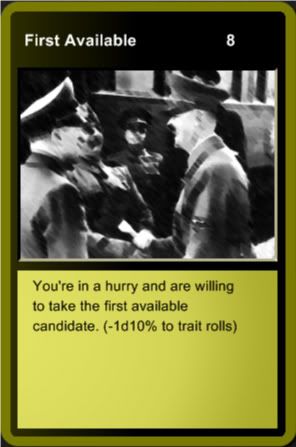
Each turn there is a new random roll which generates a candidate option. You can choose to sit and wait until you get an attractive candidate but with a minus thirty percent production impairment how many turns are you willing to wait?
What difference is there between the various candidate options (assuming that you have selected one)? Flip back to the part on what makes a CIC. A big bunch of traits. Randomly determined.
The random trait generation algorithm is weighted depending on the type of candidate you choose. The ‘best available’ is likely to throw up a higher quality candidate while ‘first available’ may not be Mr. Terrific.
On the other hand a highly qualified and capable candidate could be one with definite views on his place in the world. And yours.
As you can see, having your CIC unexpectedly walk out the in disgust is not a trivial matter. If you find that you absolutely can’t work with your CIC – and this does happen – then a carefully planned departure is the way to do it.
Summary
• Whenever you lose your CIC a level of chaos results depending on the manner of his departure
• A vacancy comes with a global production penalty depending on the chaos level
• Each turn that a vacancy exists a new candidate option is generated, determined by the chaos level
• Once you choose a candidate option a new CIC is generated, his traits weighted by the chosen option
The Art of Management
Fear not for you have, at your disposal, a range of management tools.
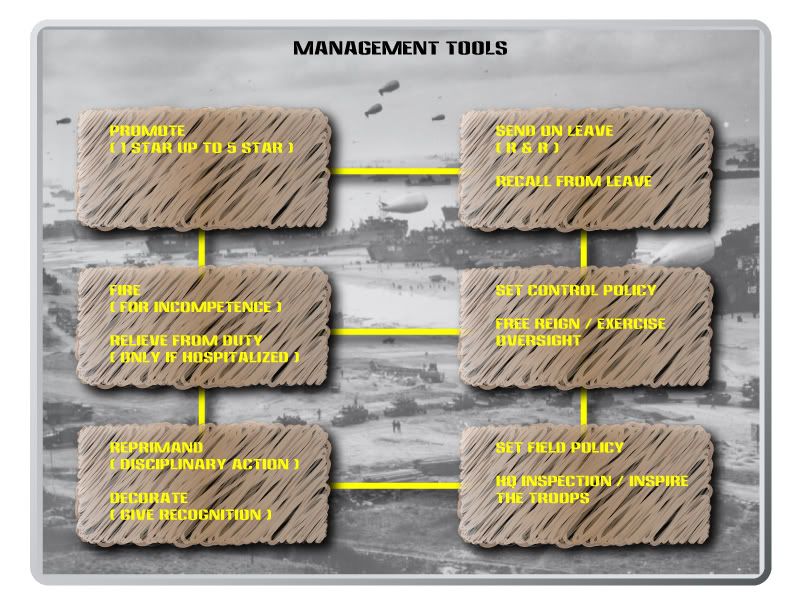
Got a CIC with a bad attitude? Haul him in for a reprimand. This might be all you need to do, problem solved. On other hand it might backfire and make matters worse. It all depends on his personality. There is a judgement call involved.
Alternatively you can wave the carrot and decorate him. Everybody likes a medal. Bound to cheer any CIC up.
Want a really happy CIC? Is he vain? Likes preening himself in the mirror? Reach into the wardrobe and find another medal. Fill his chest full of colourful ribbons and shiny metal.
Every time you do so, however, you are burning up political capital. Additionally the more medals you pin on your CIC’s chest the harder he is to fire if your relationship sours.
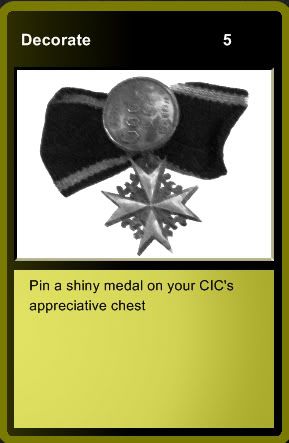
Sometimes the best thing to do is to issue a leave pass. Give your CIC time to cool down. Of course you won’t be receiving any CIC bonuses while he is on leave but it may be worth the wait in order to get a refreshed and rejuvenated CIC.
Then you have the policy settings. There are two, Control policy and Field policy.
Think of these as directives that you issue to your CIC.
Control policy has two options available. One is to give the man his head and allow him a free reign. This has significant benefits in terms of Command Initiatives, but, as mentioned above, you may find your CIC arguing with you when you instruct him to instigate an initiative.
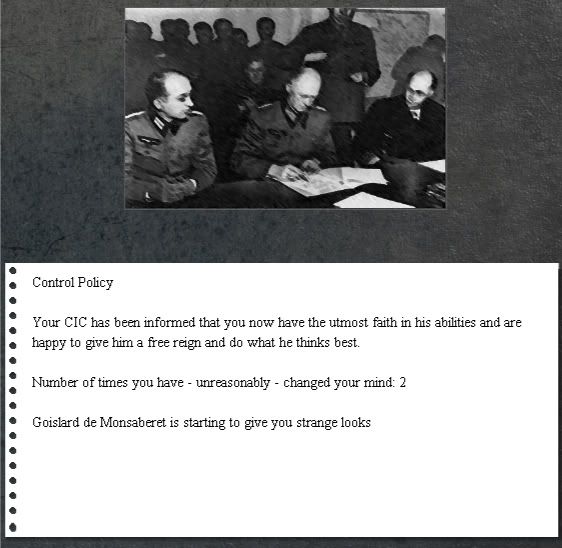
The alternative control policy is to look over his shoulder and exercise close oversight. Micromanage him.
Command initiatives will be harder to come by but you can guarantee that he will do as he is told.
Naturally your CIC may have a preference for one type of management style over another and won’t be shy in letting you know.
There are also two Field policies. These refer to the times when your CIC is visiting a field HQ. Instruct him to restrict his activities to an ‘HQ inspection’ only and that is what he’ll do. He’ll stay firmly within the confines of the HQ.
As a result the benefits that accrue from the presence of your CIC at the field HQ will be reduced but he’ll be a lot safer than if you issued the ‘Inspire the troops’ policy directive.
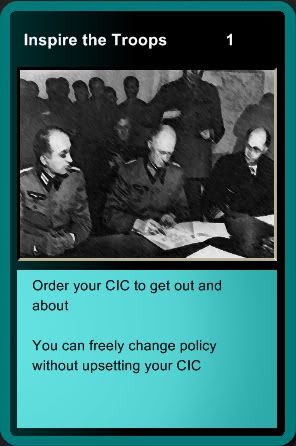
In this instance you are telling him to get his sorry *ss out of the blinkered HQ building and go out and assess the situation in person. Meet and greet while he is at it. Lots more bonuses flow to the troops in terms of readiness and morale and also action points if he instigates a command initiative.
But moving around the frontline of a war zone can be dangerous to his health.
A CIC who values his hide won’t like it if he is told to put his neck on the line while an ambitious, hard hitting CIC will be mightily upset if he isn’t allowed to get into the thick of it.
Note: Both Field policies work in the abstract. ‘Inspire the troops’ doesn’t actually mean that your CIC SFT will physically leave the HQ unit. Your CIC is – at all times – restricted to being located in a Headquarters unit.
Your management options are greatest when you CIC is present at your SHQ. A CIC who is out visiting field HQ’s is largely out of your reach. No CIC, however, will refuse if you ask them to return to SHQ at your capital.
Summary
• You can set policy directives instructing your CIC in how to conduct himself
• You have various options to encourage, intimidate or rest your CIC
• A CIC’s personality has an impact on how he reacts to your actions
• Management options are greatest while your CIC is located at your SHQ
